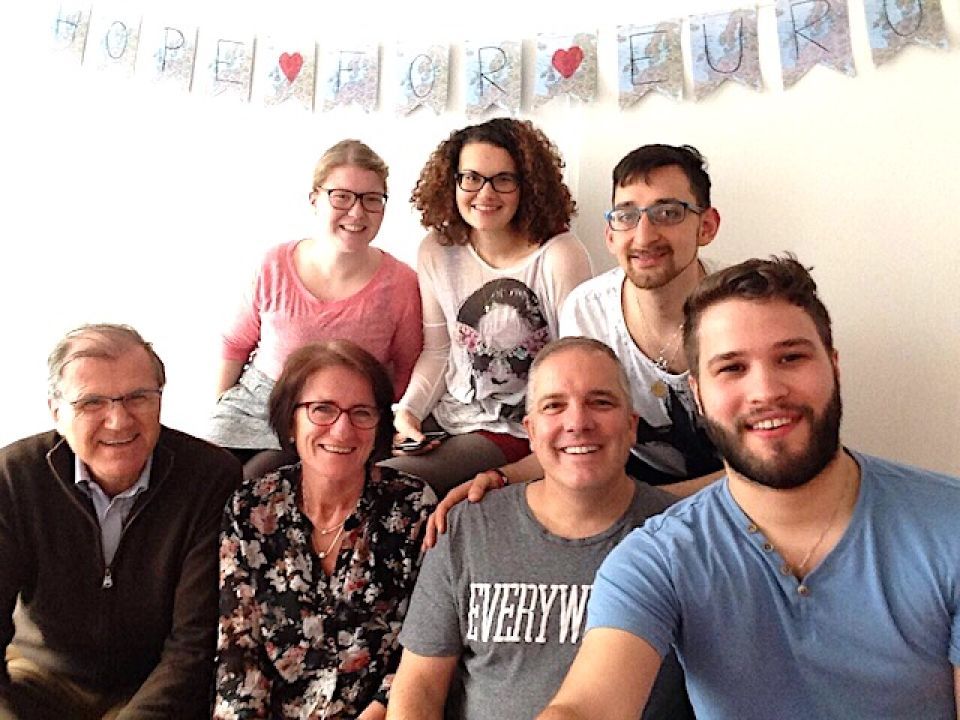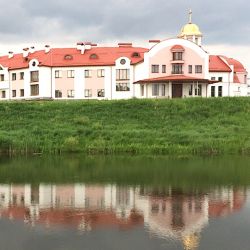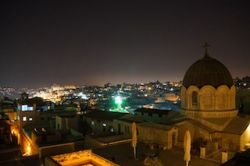How old will you be in 2033?
Meeting with the YWAM team, Oliver asked three questions.
1st How old will you be in 2033? Between 40 and 45 years old. For Harald fifteen years is very far away, for Victoria it’s just around the corner.
2nd What does the resurrection mean to you? Sarah replied “thanks to the resurrection, a torrent of life pours down on us”
Victoria tells us that the resurrection is a victory of life over death which starts right now, while Harald said “thanks to Jesus’s resurrection I am able to have within me the life of God”.
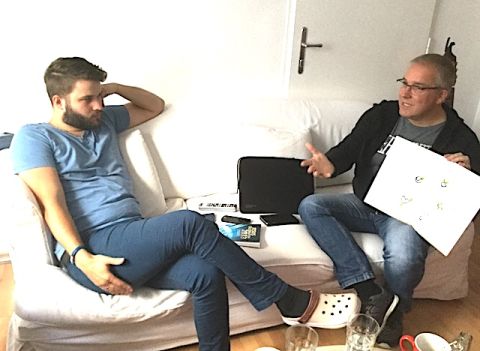 Harald et Olivier
Harald et Olivier
3rd: How does the project JC2033 connect with you?
Here are some ideas: visit everyone, each mission should be committed to a grand “march for Jesus”. Not just in Vienna, all the towns and the churches in Austria.
We ended with a “Lectio divina” the great text of the resurrection where Jesus met his disciples, breathed his spirit on them, and sent them off giving them the power to forgive (John 21). It was a wonderful moment of spiritual communion.
Following this exchange we prayed a short prayer reminding us of Christ’s resurrection, the gift of the Holy Spirit and the constitution of the Church, where forgiveness is a living reality, one and the same mystery:
Through your resurrection Jesus,
You blow your Spirit upon me
So that I may forgive.
Give me this strength of forgiveness
So that your Holy Spirit impels me
To go out into this world which you love!
Self-appropriating the vision
After this we had a meal in the Café Engländer where pastor Karl Peloshek was waiting to meet us. He is the president of Christen in Wien (Christians in Vienna). Bringing together Christians of various churches with the aim to bear witness to the Gospel.
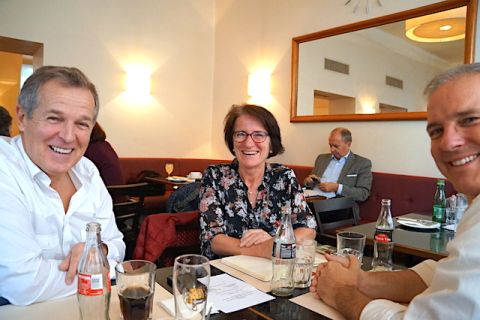 Karl Peloschek, Barbara Allan et Olivier Fleury
Karl Peloschek, Barbara Allan et Olivier Fleury
In his words: “My first reaction concerning JC2033, was that one must not wait for that particular year. We must start now. But I am not used to plan so far in advance”.
He asked many questions: What will the world look like in 2033? Will we still be free to celebrate and to bear witness like today? Will relativism expand in Europe? What place will Islam have?
He was pleased with our approach focusing on Christ’s resurrection and how we can experience it today. “Your presence is precious. It is even an answer to our prayer that the Lord sends his labourers for His harvest in Austria”. The March for Jesus just took place in Vienna and reunited 90% of the Christians. He would like an even greater union, one of spirit and heart. “We must personally take on your vision”. To conclude, whilst finishing his Viennese coffee, he said: “I will ask for this in my prayer.”
“This project could energize us”
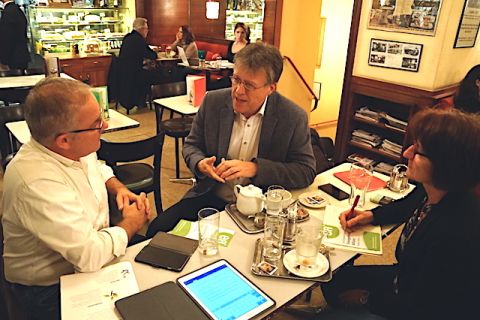 With Gunther Körber
With Gunther Körber
We met Günther Körber in the Philosophical Café “Korb”. He is the director of The Viennese Evangelical Alliance uniting members of the Protestant and Evangelical churches. Vienna has a multicultural society: several churches came with immigrants and are represented by the Evangelical Alliance. They come together for prayer meetings in a hall in the railway station offered by the municipality.
G.Körber is engaged in “Network for Christ” which runs a “House of Jesus” to reach young people. “One must always find ways to reach them. Not only with ideas, but also the means to realize them. It is in this context that I see JC2033. This project, being centred on the Resurrection, could energize us”.
The Holy Spirit is active at all times and everywhere
Le lendemain matin, nous traversons le Parc de la ville pour visiter le chanoine Patrick Curran, de l’Eglise anglicane. Ce dernier est honoré que nous ayons pensé à visiter sa petite communauté à Vienne.
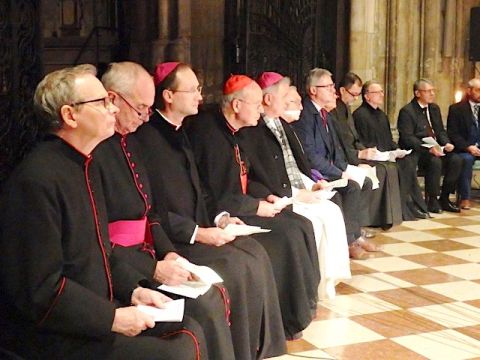 celebration in the St Stephen's cathedral of Vienna
celebration in the St Stephen's cathedral of Vienna
The next morning we met Canon Patrick Curran of the Anglican Church. He was honoured that we came to visit his small community in Vienna.
JC2033 instantly brought back pleasant memories of the decade of evangelization in England prior to the year 2000. It was the evangelical leaning congregation of the Anglican church that launched it, also creating certain tensions…
But since the world has changed. The church has lost influence, and now better understands the need for evangelization.
“You have a wonderful project. Those who take missionary work seriously will surely participate. Each Christian community is a community of the Resurrection. One must respect their life experience. There are many resources in our traditions. One must not neglect them. The Holy Spirit is active at all times and everywhere.”
He advises us to work with the whole church and not to be drawn towards pragmatism. He greatly appreciates the “five DNAs” of JC2033 which match the marks of the Church, he said: “Convince all the churches of their importance, just as the Moslems are convinced of the five pillars of Islam. Help people to assert their faith in a common language. Let us not say that our time is worse than the others! We all need redemption”.
A process of participation
We met leaders of the Focolari movement in the outskirts of Vienna who welcomed us in a former shoe factory. It was not the first time that we met the members of this movement for unity. Peter Forst, in charge of the German-speaking countries, said that he recognises himself in our five DNA, particularly unity: “If the movements get together we can join up with all of God’s people. Each movement has their charisma.” He encouraged us to leave enough space for the various forms of prayer. It would not be a good thing for one tradition to dominate all the others.
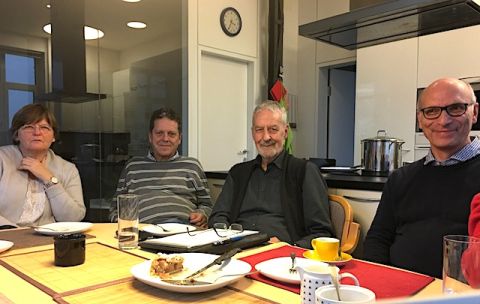 Focolare of Vienna
Focolare of Vienna
Johannes Vetter reminded us Pope Francis’s words on the importance of starting a process of participation to reach everyone. He considers the project JC2033 as a significant expression in this direction.
Dirk Kennis encouraged us to build a network of personal contacts: “Christianity passes through meetings amongst God’s people and between the leaders”.
Becoming disciples of Jesus
In the archbishop’s palace, opposite the cathedral, we met Otmar Spanner and Andrea Geiger responsible for “Mission in the city”. They explained Cardinal Schönborn’s emphasis on the importance of becoming disciples of Jesus.
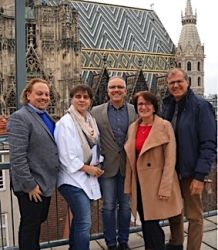
Andrea sees events like 2033 as an answer to the Lord’s call expressing unity. Unity in the mission is even more important than theological matters that divide Christians. “We celebrate Christ’s resurrection every Sunday, but what is its impact? Let us take seriously what the world needs. The main thing is to share together the experience of Jesus’s friendship.”
Spanner added: “Your view is similar to what is dear to me. Our challenge is to integrate this view into our Church, as it is a big organisation which needs to rediscover what it means to be a disciple”.
Start with love
Next we met in the Lugek restaurant, a Viennese landmark, with Maximilian Oettingen of the Loretto community. Together we had a generous helping of Wienerschnitzel!
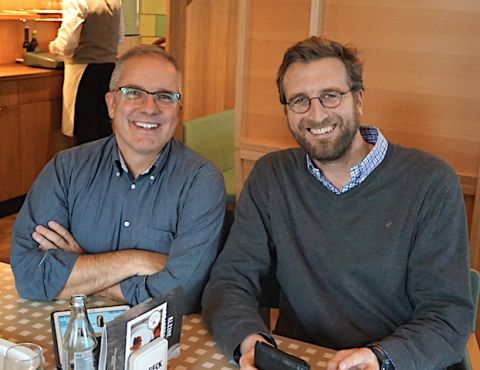
Loretto is a Catholic movement for a spiritual renewal; there are about fifty prayer groups in Austria, Switzerland, Germany and the South Tyrol. Oettingen stated that “our identity can be characterized by our relationship with Jesus Christ and not by doctrine or the liturgy. If we just stick to formality then it becomes idolatry”.
He appreciates Pope Francis’s statement that above all we are Jesus’s disciples, quoting him: “The Catholic Church is like an old lady who needs to be taught once more to stand up and dance”.
He left us the following bits of advice: ”be very humble. Don’t try at first to outline your profile, but instead start with love! Love all the Churches! Go to where the Holy Spirit breathes into the Catholic Church!”
Draw from the source
That evening we went to the cathedral for the ecumenical opening service of Together for Europe.
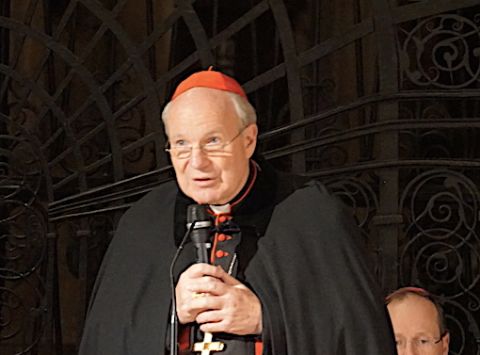 Cardinal Christoph Schönborn
Cardinal Christoph Schönborn
Cardinal Christoph Schönborn’s sermon was addressed to delegates of fifty movements throughout Europe. He reminded us the 10th of November “Kristallnacht” signalled the beginning of the Nazi persecutions against the Jews. The start of one of the greatest catastrophes in history. Where is Europe heading now? On the path to unity in diversity, or towards a divided Europe?
He maintains that: “We must go back to the mystery of the Cross of Christ, which is the source for a united Europe. We should all bear witness to this inner source, but Christianity has many dark zones in Europe. We should hold ourselves close to the Cross and the Resurrection, and do our utmost to make it all start from Jesus”.
Gladdened by this call to put Christ in the centre of our lives, We had the opportunity to thank the archbishop of Vienna and give him a brief presentation of the JC2033 vision, which is also firmly focused on Christ.
A culture of visits
The theme “going back to the source” was thouroughly discussed during those two days at Together for Europe on the outskirts of Vienna. The source of all Christian movements is the Paschal Mystery: the Cross and the Resurrection.
Appeals were made several times to get to know each other better, to put into practice the culture of visiting in order to create friendship between the south and the north, the east and west of Europe.
“Each visit is a contribution to the renewal of Europe. What are we looking for in our host when we visit him? We are looking for Christ. He is the soul, the essence of Europe. He has visited Europe and will never leave it. He binds us together more than anything else”.
A “culture of visits”: is it not what we seek to put into practice while working on the two thousand years of Christ’s resurrection?
Europe’s secret is the presence of the Risen One amongst us. I was particularly touched by the words of Thomas Römer, in charge of Young Men’s Christian Association (YMCA) of Munich, who said: “Europe is beautiful. It is an organism and not an organization. An organism has a soul and the soul is a beautiful thing. Look at the beauty of Jesus crucified and resurrected in each of our communities!”
Presenting the wife to her husband
During this trip we presented the JC2033 vision to various people and to recorded several interviews. Maria Wienken from the Centre for Unity of the Focolari, Bruno Pouzoullic of the Emmanuel Community.
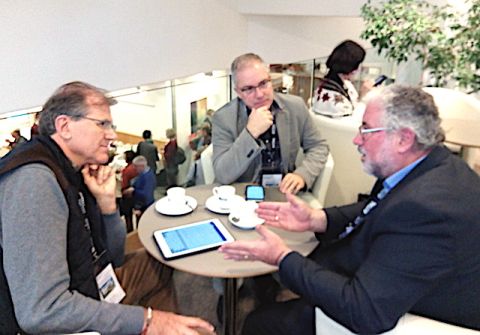 With Johannes Fichtenbauer
With Johannes Fichtenbauer
Our memorable meeting with Johannes Fichtenbauer, deacon of the Catholic Church, chairman of the Way for Reconciliation and the European Network of Communities, said: “this project has strength because of the time available to us. But you should set up an advisory committee with representatives of the churches and the movements. You need their support and you must propose stimulants with a vision.”
He is also secretary of “Toward Jerusalem Council II” (TJCII), a movement whose purpose is to prepare the second Council of Jerusalem to bring to light the reconciliation of those Jews who recognize Jesus as the Messiah and Christians from the nations. He sees the 2033 celebration as a step for its preparation.
We met once more the next day when he shared his excitement with us: “I was quite moved by yesterday’s meeting. I realized that there is an immense potential for the year 2033 and the way leading to it. I had the impression of a divine meeting and I can clearly see a coincidence between TJCII and JC2033: presenting the spouse to her Husband in sanctity, unity and diversity”.
Martin Hoegger

